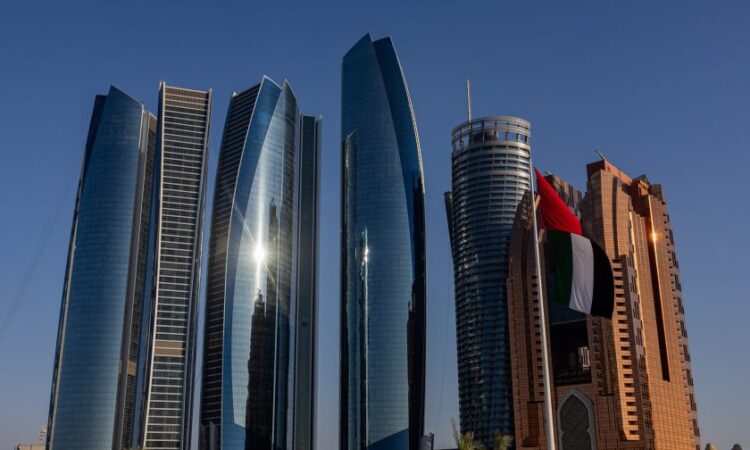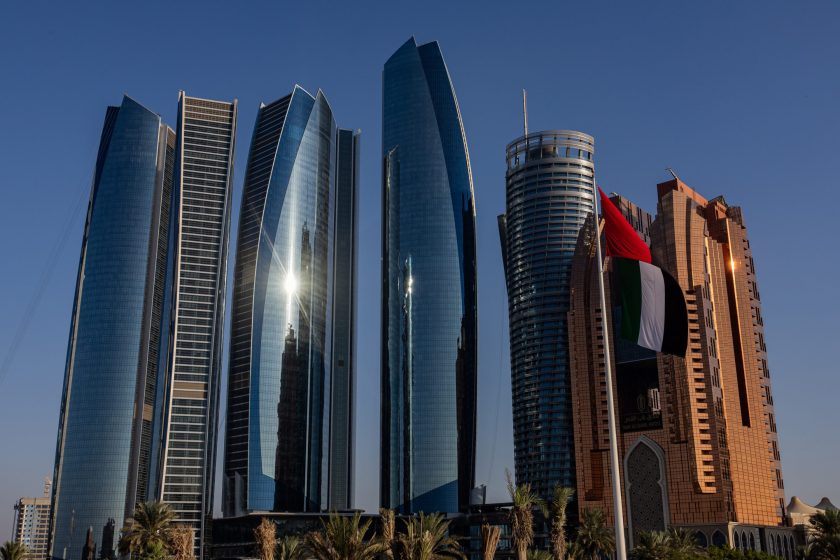

The Etihad Towers, surrounded by residential and commercial properties, in Abu Dhabi, United Arab Emirates. Christopher Pike—Bloomberg via Getty Images
Good morning from Los Angeles. I’ve just returned from the United Arab Emirates, where I joined my Fortune colleagues in hosting Fortune Global Forum, a remarkable event that brought together the likes of hedge fund titan Ray Dalio, the CEO of McLaren Racing, and former U.K. Prime Minister Tony Blair. It was eye-opening to visit a tiny country that has emerged as a key intersection of East and West, and whose leaders are busy investing its massive petroleum wealth in other sectors to diversify the economy.
Abu Dhabi—one of the seven emirates that makes up the UAE—is betting hundreds of billions on artificial intelligence projects, and has stood up an economic “free zone” for international commerce. This free zone, known as ADGM, offers streamlined licensing regimes and, to my surprise, the wholesale incorporation of British common law to offer predictability and govern commercial disputes. The ADGM also oversees Abu Dhabi’s virtual asset regime, which has offered clear rules for crypto since 2017. The crypto regime is not just something that sits on a shelf—a fellow conference attendee told me she had bought an apartment with Bitcoin in neighboring Dubai and that it’s easy to use crypto for a wide variety of transactions across the UAE.
The Middle East, of course, is hardly the only place to clear the path for wide-scale crypto adoption. Asian countries like Singapore and Japan have introduced laws to integrate virtual assets into their economies while protecting consumers, and the EU has recently done the same. Then there is Hong Kong, which is embracing crypto not only for commercial reasons but for geopolitical ones too.
The Financial Times recently made a convincing case that the Chinese Communist Party is using Hong Kong’s new virtual asset regime—which includes a requirement for certain banks to accept crypto—as part of a larger strategy to undermine U.S. control of the dollar.
“The best ‘new’ money is here: digital dollar stablecoins and other tokenised crypto pseudocurrencies. Unlike the ‘old’ dollar—easily regulated, tracked, and tethered to Washington, D.C.—offshore crypto transfer systems operate outside the extant global regulatory net. They’re effectively stateless,” the FT observes. This is a bad thing thing for the U.S. as the spread of unregulated stablecoins in Asia will diminish the importance of legacy money transfer systems like SWIFT, which the U.S. can control.
The question is how the U.S. intends to respond to all this. Currently, the Biden administration’s response has been to try and stifle crypto through zealous SEC enforcement, and by throwing sand in the gears of any legislation that seeks to expand the use of stablecoins. This is understandable as the country’s control over the dollar—and, more specifically, the ways that dollar can move around—helps America project power around the globe.
This sort of dollar diplomacy is not a bad thing, especially at a time when China is regressing into a Mao-style dictatorship. And while Abu Dhabi’s economic free zone is a clever idea, the country has a ways to go when it comes to other types of freedom—which will hopefully blossom in time. The problem for the U.S. is that it doesn’t have the power to stop crypto. Blockchain is a superior technology for moving money around, and history has shown again and again that you can’t put new technologies back in the bottle. Instead of seeking to smother crypto, the White House needs to make the U.S. a leader when it comes to digital assets—especially as it’s become clear the rest of the world is moving forward with crypto whether the U.S. likes it or not.
Jeff John Roberts
jeff.roberts@fortune.com
@jeffjohnroberts
DECENTRALIZED NEWS
SoFi, under pressure from the Fed, is forcing all of its crypto customers to move their accounts to Blockchain.com in coming weeks or else see their assets converted to cash. (Fortune)
Warren Buffett’s sidekick Charlie Munger, who has died at 99, was known for one-liners, including ones skewering Bitcoin as “noxious poison” and crypto as “partly fraud and partly delusion.” (Bloomberg)
The Treasury Department sanctioned the crypto mixer Sinbad, alleging North Korea had used the service to launder hundreds of millions of dollars stolen in crypto hacks. (Fortune)
A study of Web3 games shows the average annual failure rate is over 80% for the past several years, casting doubt on the viability of the industry’s “play-to-earn” model. (CoinGecko)
Billionaire Mike Novogratz, citing the impending arrival of crypto ETFs, predicted Bitcoin could return to its all-time high of $69,000 by this time next year. (Bloomberg)






